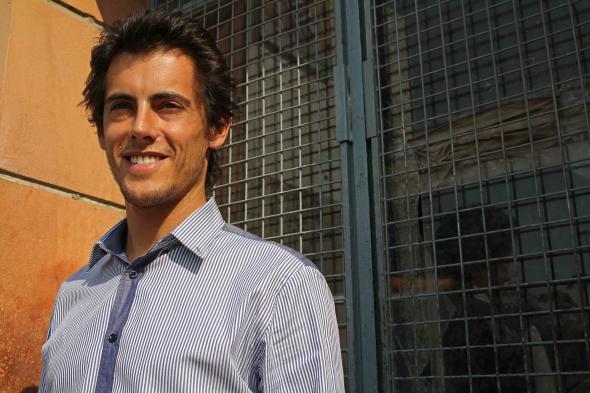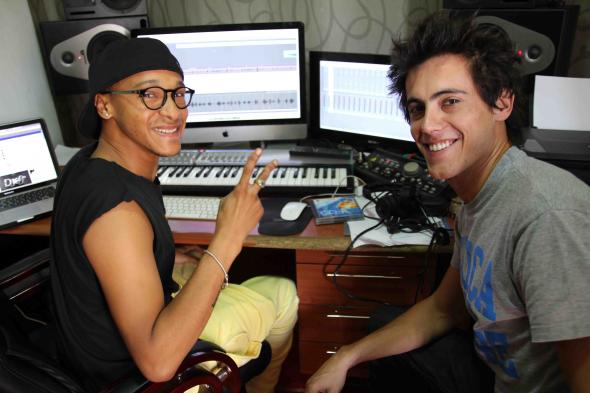African Music is going to get an ever higher international profile
 Benjamin Lebrave, photo by Marta Lança, Luanda 2008.
Benjamin Lebrave, photo by Marta Lança, Luanda 2008.
He was back in Luanda to take part in the 1st International Conference on Kuduro, on the lookout for talent. He paid a visit to studios in the musseques (local neighbourhoods), he had talks with producers to give support for his Akwaaba Music, a digital platform dedicated to African music and pop culture, providing visibility for quality people in music who don’t have the structure needed to go far in the business. In the last 3 years, Lebrave has produced works with more than 70 artists from 15 African countries and has been working on the development of a global network covering the production of contents, digital distribution, marketing and licensing. Lebrave is from Paris, but he set up his headquarters in Ghana, and now he travels to and from Senegal, the Ivory Coast and Liberia, showing the world what the continent can do. Benjamin Lebrave is also a wee-known international DJ, working under the stage name of BBRAVE and he created a night of warmth and excitement in the Elinga in Luanda.
As a participant in the International Conference on Kuduro, did you find the multiple approaches to Kuduro interesting? Covering music, social sciences, linguistics, with Kuduru specialists involved?
I think it was good for us to get to know each other. I’m happy to be here and to have the chance of talking to Kuduru specialists. My presentation was made for them. And in fact it turned out to be research centre for intellectuals, so I don’t know if very academic presentations really help.
During the first years here in Angola, there was a lot of suspicion about Kuduro. It was seen as a marginal, delinquent phenomenon. Do you think that prejudice is over and done with?
I spoke with many people from the town and they still think it is marginal. Producers and dee-jays do not want to know about culture. They are famous because of Kuduro, but they stand to one side.
As far as you are concerned, what is the most interesting thing about the Kuduro phenomenon?
Well, my Portuguese is not very good, so I don’t know hardly anything about Kuduro rhymes, and what interests me more is the music side of it. By and large, when I listen to music, I don’t listen to the lyrics. It’s the same for English and French. I have favourite songs that I don’t understand in the slightest. I find it very interesting, the rhythm is in my head without me realising it, the music is spontaneous. I like electronic music a lot, but what is missing there is that it’s not spontaneous, it’s just a “science”. I like the early years, when it all began in Detroit in the 70s, because they didn’t worry about the quality of the sound. The ideas were pure. And for me a Kuduro beat is the same thing. There is an essence to music. It may be repetitive, but there’s an idea. For me, each beat is an idea.
And you think that this will not finish by being easily absorbed in a kind of “Kuduro formula” that everybody repeats?
I was in Luanda three years ago and it’s the same thing now. There are other things, but if it changes, it’s not Kuduro. It depends on the definition. But why not call Kuduro something different? As if there was an authentic something about Kuduro…
And what are the references that you like the most about Kuduro? For example, did you get involved in publicising the work on Killamu?
I like the Marçal Killamu very much. I don’t have an overall vision, my point of view is that of a foreigner: Killamu has a sound which has many ideas, but it hasn’t got a structure, and that’s a pity. I think of it as the work of a great artist.
What voice does Kuduro transmit for you?
I really liked rap when I was young and I think that Kuduro, like rap, is very strong. It’s like a spokesperson. I am in a house in the Combatentes area, and when I go to the other side of the street, I seem to be in another world, that nobody else worries about. Then it’s the voice of that world.
What are the influences of other musical styles in African pop, which is the basis for your research for Akwaaba?
Generally speaking, I think that “black music” has grown in terms of types. In recent months there is a new type, Afrobeats, and this is more like Nigerian pop with a bit of South African House. It’s beginning to get played a lot in England on mainstream radio such as BBC1. For me, Africa is potentially a world-beater. I think that for various reasons, people here are more spontaneous. Dancing plays a part in this. It’s more natural here than it is for a European to make music for dancing. And these types of music have great potential. Afrobeats is the first sign of this. I think there are reasons for this potential: the technical and musical links and globalization.
How did the idea of creating Akwaaba come about?
It began when I was working for a music distributor on the Internet in 2007. My job was to put producers together, above all in the USA and Europe. At that point, I had no idea how to get the music out of here. There was an industry of world-music, but for me this is a very limited vision. It’s not the real music of Africa. I don’t think the music is bad. It’s good, but a lot more exists. I got to know Kuduro in 2006 and I thought: what is this? This is not world-music, it’s much better! I’ve got a dee-jay’s sensitivity and I like music for dancing. After putting together a catalogue big enough to start a company and to record, I created a website. As I was working in the distribution campaign, I was getting to know the agencies, etc. That’s how I started.

And how does distribution work, your 50/50 principle?
50 for the artist, 50 for the producer. There are various opinions: there are those who think that this price I apply is a big price to pay. The fact is, though, that sales are no great thing.
And that doesn’t pay off?
I don’t make much money. The only way for artists to make a lot of money is to be a great success or do lots of gigs.
What do you look for in artists, what are your criteria for them?
That’s also changing, because at first it was more inclusive. Now there are more people paying attention to Akwaaba and I can’t reach them all.
Are you being more selective?
Now I’m more selective. But I want to start another music house, but only for distribution. But in economic terms, this is more difficult.
Are you the only one working on Akaaba?
Yes, but with many people helping: to do the mixing, on the website, with the covers….
Are you also involved in the recording of the discs?
Just a little, because I have a small studio. But I’m really a producer. I can record voices, simple things, but creating music, no I can’t. One of the ideas I have for Akwaaba is to see joint projects. I have spoken with artists here in Luanda about working together with artists from Ghana, but unfortunately this hasn’t happened yet.
Your role is also to create bridges for joint work. Between countries and times. Doing compilations and re-editing some old music, as was the case of the works of Carlos Lamartine. Tell me what happened.
I met him in Brazil, where he was working at the Embassy, and we decided to do it. In fact, there are two problems when it comes to re-editing: the records and the rights. In a country like Angola after the war, it is impossible to find who holds the rights. I want to do something that helps the artists, but the problem with this old music is that the contracts are generally heavily weighed against the artists. To do the thing correctly, I should have made a contract with the producer, but I wasn’t interested. The producer is the one with the big house, but the artist isn’t. Many of them now do not even have a guitar to play. There are many artists who would do interesting work, but in ethical terms that’s not good enough for me.

Do you make a point of keeping transparency in what you are working on?
I think the musicians are suspicious. When I leave, it gets difficult for them. I think that now, from Ghana, it’s a way to tell them I haven’t gone away.
It’s easier for me to work with artists that have international experience, because they know it’s difficult. They know that 50/50 is not bad. But it’s ironic, because I’d like to give more help to those who don’t have any experience. In Ghana, I keep a connection with a musician who has lived in London for 10 years. He’s not rich, but he has experience and over there they think he’s cool. I’m talking of kids who know nothing. But now it’s a lot easier, because there’s a website with a lot of artists and I can give them contacts so they can get in touch with people. There is transparency through accessibility.
Picking up your presentation on Kuduro again, what are the big steps for experts in Kuduro, or for young musicians to be able to get a higher profile in the world of music?
Go to the Internet. You don’t spend so much there. I know that in some parts of Luanda access is not easy, but the important thing is to stay there, because that’s where the music springs from. It’s important to spread the word. Musicians have to show that they are original. We don’t want to hear what we’ve already heard, merely from a technical point of view. Get yourselves a facebook page and twitter. You don’t need a sponsor to do a clip, you just need an i-phone. There are creative ways of recording. I did a dreadful clip of two kids dancing and suddenly it has 5 thousand hits. And it doesn’t cost a thing. In the world outside, there are many people who don’t speak Portuguese and the words, fortunately, are not important. What is important is that the music is original and the sound is high quality. It’s easier if you’ve got money and a good studio, but I’ve seen studios in Liberia with nothing, and the sound was not fantastic but it was good.
Would you like to have a stronger relationship with Angola?
Yes, I would. I think Luanda has massive potential. I intend to stay here for a bit, to see how I can keep in touch with people. This is what’s important.
from the angolan magazine Austral nº 92 (2012)